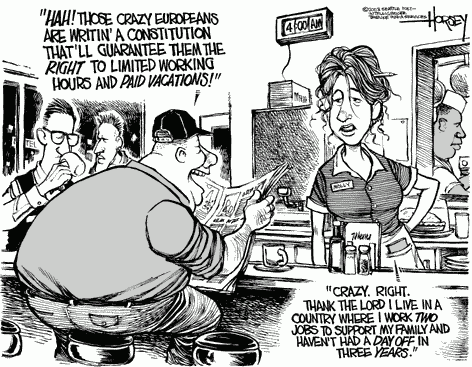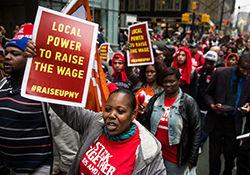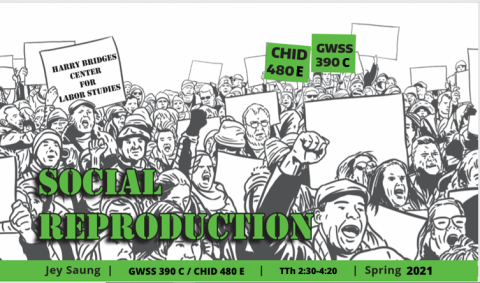Spring 2021 Course Announcement
Throughout 2020, the COVID-19 pandemic taught us the importance of 3 W's: Wash your hands, wear a mask, and... work?

In the midst of a global crisis, millions of Americans showed no signs of surrendering their labor. Healthcare workers were recognized as the backbone of our country, sanitation workers took extra care in keeping social spaces safe, and transportation workers continued to serve the needs of our people. From the fusion of recent nation-wide activism and labor's importance, more scholars than ever have put America's labor issues under a magnifying glass.
Recent growth in the Labor Studies Minor and unprecedented enrollment numbers in the Intro to Labor Studies course have shown just how eager students are to understand and demystify the complex nature of labor issues world-wide.
To accommodate for the growing interest in Labor Studies, the Harry Bridges Center will be sponsoring a number of diverse, labor-related courses in Spring 2021. These courses include HSTAA 353 (Class, Labor, and American Capitalism), POL S 334A (Violence, Exploitation, and Exclusion in U.S. Labor Markets), and GWSS 390C (Feminist Social Reproduction Theory and Radical Politics of Care).
For a full list of courses currently offered in the Labor Studies Minor, click here.
For information on Spring Quarter 2021 registration dates, click here.
HSTAA 353 A: Class, Labor, And American Capitalism
One of the central aspects and key introductions to labor studies is examining the economic system it works within. Capitalism in America, in summary, shapes the worker's experience and interaction with labor.
The political cartoon above begins with, "Thank the Lord I live in a country where I work two jobs to support my family and haven't had a day off in years." Suspiciously accurate statements about labor often signal an alarm to labor studies scholars, who begin to ask why these desperate, commonplace situations have become so ordinary in society.
Taught by Professor James Gregory, HSTAA 353 A (Class, Labor, and American Capitalism) delves into the relationship between working class people, social movements, and societal paradigms under American capitalism. Students in this course will examine the history of American capitalism, its subsequent class formation, and changes in race, ethnic, and gender relations over time.
Keys topics that will be covered include:
- Values of work, leisure, and consumerism throughout American history
- Organized labor and American radicalism dating back to the 1820s
- Contemporary patterns of social inequality
- The current state of labor unions and other forms of organized labor
Note: HSTAA 353 A is a Labor Studies Minor core course, plus it counts for W-credit (writing) and satisfies DIV and I&S degree requirements.
POL S 334 A: Violence, Exploitation & Exclusion in U.S. Labor Markets
POL S 334 A, a special course under Topics in American Politics, exposes students to the modern and historical conditions in U.S. labor markets. Students will study the connections between violence, exploitation, and exclusion in labor markets, while also exploring and utilizing critical theories.
Rebecca Thorpe, Associate Professor of Political Science at the University of Washington, breaks this course into three parts.
"First, we examine foundational theories of economic and political power, including classical liberal, Marxist and feminist perspectives. Second, we apply and interrogate these theories in the context of racialized, gendered, and contingent labor. Finally, we shift focus to the development and growth of underground economies, including the drug trade and sex industry."
In this class, students will:
- Question the ways in which racial, ethnic, gendered, and geographic hierarchies create and fortify categories of citizenship and belonging
- Make connections between labor struggles and political thought through the medium of critical theory analysis
- Begin to conceptualize labor as a site of struggle, resistance and solidarity
CHID 480 E / GWSS 390 C: Feminist Social Reproduction Theory and Radical Politics of Care
“To labor is to produce something. That can take so many forms, whether that be a product in return for wages, or something more symbolic, such as expending emotional labor to care for a friend,” explains Jey Saung, who will be teaching CHID 480 E / GWSS 390 C: Feminist Social Reproduction Theory and Radical Politics of Care.
“In this class the focus is on the forms of work and labor required to produce and (re)produce modern society….and the conditions that make our contemporary ways of working possible.”
Students will explore a broad range of social reproduction theories that look at capitalism and the ways in which it functions together with neoliberalism, racism and sexism. They will also engage in conversations about gender, race, class, ability and labor through an intersectional feminist framework.
A major focus of the class will be on caring labor because, as Saung states, “caring labor is the work that is required for our society and our workforce to reproduce itself. This can range from the quotidian and the mundane, such as cooking, cleaning, and budgeting, to the abstract and the incredibly challenging, such as bearing witness to grief, loss, happiness, and joy.”
By seeing society as a product of our labor (in several forms) and our main identity within this system as workers, students are encouraged to think critically about the kinds of systems that are, and can be produced through the work they do and how society might use its labor to bring about social change against contemporary forms of life that have led to the dispossession and devaluation of many.
For example, in the field of caring labor it is only “through recognizing the ways in which our systems of power have historically denigrated and devalued this kind of work – which is usually done by women and femme folks of color – that we can begin to acknowledge the people who take on this labor, center their knowledge and experiences, and work towards an epistemological shift,” Saung argues.
Additional themes and questions to be addressed include:
- How are workers at the same time produced by the societies they also help to manifest/create?
- How is the family implicated in producing the worker?
- How do we understand reproductive labor through international political economies, such as transnational commercial surrogacy?
- How can we come to understand queer and trans labor within the chain of the care paradigm?
“One of the biggest takeaways I hope students will get from the class is how to think at the level of systemic and institutional analysis. It is easy to get mired in the interpersonal, particularly when talking about the ways in which caring labor is manifested. And though the interpersonal is important, I'd also like students to come away with an understanding of how conditions are produced and reproduced through larger systems of power within the U.S….” Saung concludes.


